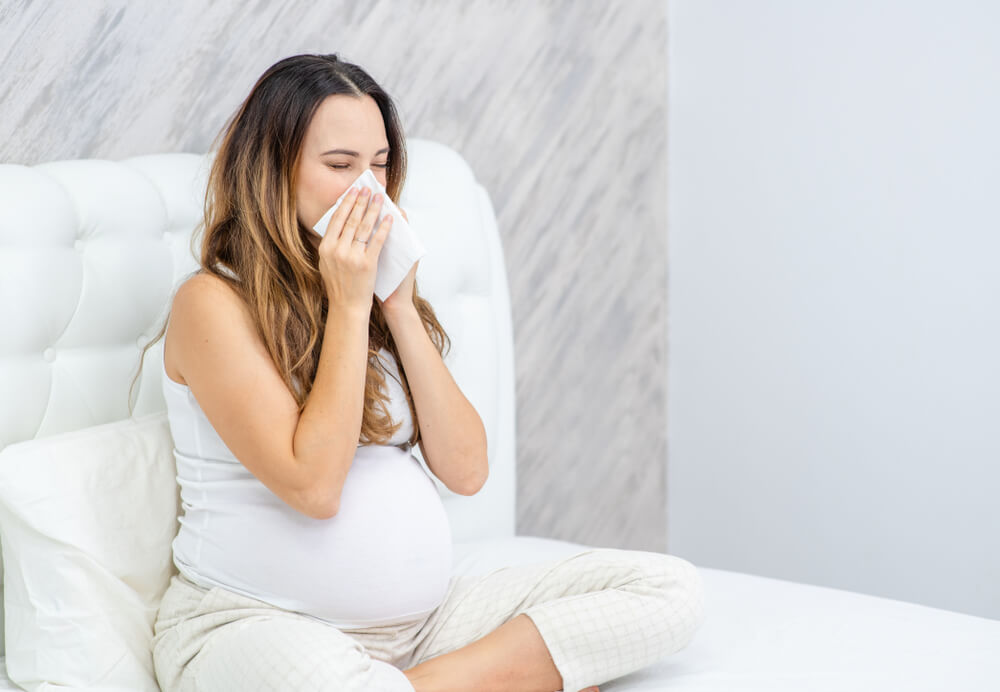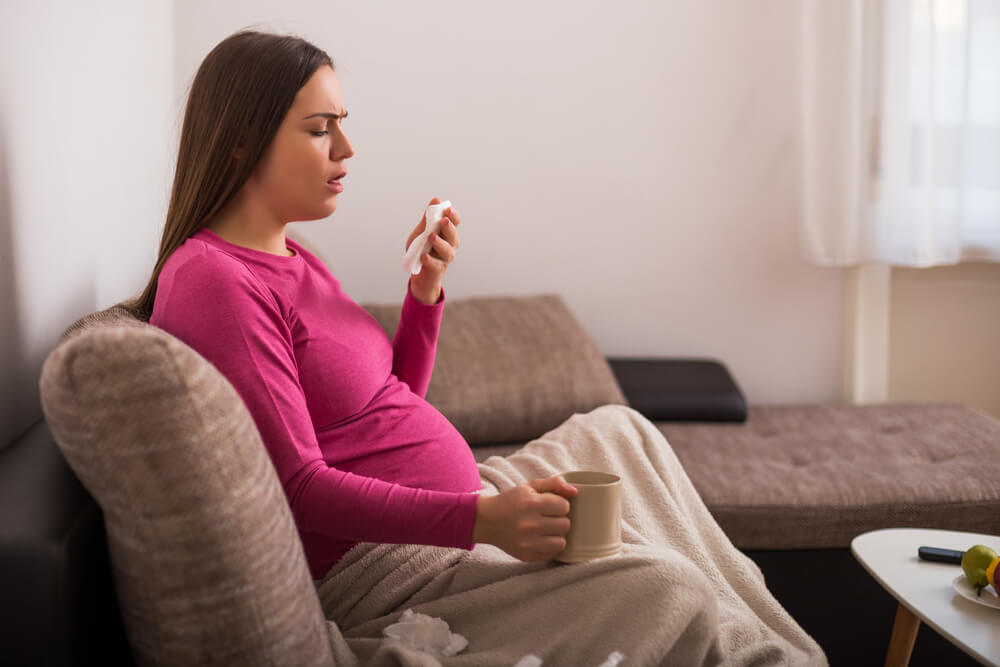Allergy symptoms, such as a stuffy nose, sneezing, and watery eyes, are unpleasant at the best of times, let alone when pregnant. Certain precautions should be taken when seeking allergy relief when pregnant to ensure the health of the developing infant. After all, not all meds and treatment options that you might be used to and found effective are safe to take when expecting. If you have questions about allergies and pregnancy, don’t hesitate to seek professional advice from an expert obstetrics specialist in Florida.
The Cause of Seasonal Allergies
The immune system protects the body from harmful invaders like the influenza virus, the common cold virus, and other infection-causing microorganisms. However, there are times when your immune system attacks your body for no good reason. Seasonal allergies are an example of this. When your immune system reacts negatively to more prevalent allergens during a specific time of year, you have seasonal allergies. Pollen is the primary culprit when it comes to seasonal allergies.
Seasonal allergies may be more troublesome during pregnancy. Spring allergies often begin around February and last until early summer, though this timing varies significantly from region to region. Fall pollen allergies can start in late summer and last through the season. Another illness that can produce allergy-like symptoms is rhinitis during pregnancy. This typically takes place during the third trimester. However, rhinitis during pregnancy is caused by additional hormones rather than allergens.
Allergies and Pregnancy – What You Need to Know

Try to Stay Away From Things That Could Set Off Your Allergies
Allergy symptoms are typically caused by environmental allergens, including pollen, mold, and animal dander. Additionally, they are the allergies that are the most challenging to avoid.
When pollen and pollution levels are high, staying indoors as much as possible is recommended. Reduce exposure by turning on the air conditioner or fan and closing the windows.
However, if you’re experiencing issues with indoor air quality due to mold or pet dander, you might want to try opening your windows (at low pollution and pollen levels).
If you suffer from dust allergies, you should clean your home frequently or have someone else do it. Do not stir up dust by using a dry mop or a vacuum that does not have a HEPA filter. Using a wet microfiber cloth rather than a feather duster is preferable. Avoid places like basements, attics, and storage closets as much as possible.
If you have a pet allergy, let your friends with dogs and cats know ahead of time to make appropriate preparations. Making one room (at least) in the house pet-free can help if you develop an allergy to your own pet.
Speaking of allergies and pregnancy, it’s best to avoid being among smokers. Smoking may worsen the symptoms of those who suffer from allergies. Neither you nor your unborn child benefits from being around secondhand smoke during pregnancy.
For Mild Allergies, Try Home Treatments
Congestion in the nose is one of the most common allergies while pregnant.
A practical solution is to install a humidifier in the house. It will make the air more humid without actually eliminating the allergies. Your aggravated nasal passages may feel better after that, though.
Using salt water or saline nasal spray may also help alleviate allergy-related congestion. To make a saline nasal spray, mix 1/4 teaspoon of salt into 8 oz of warm water. Put the mixture in a nasal spray bottle to rinse and calm aggravated nasal passages.
Exercise Caution When Selecting an OTC Allergy Treatment
There are few things more dangerous than taking medicine for allergies while pregnant.
However, two OTC antihistamines, namely loratadine (Claritin) and cetirizine (Alleroff and Zyrtec) are allergy medicine safe for pregnancy and nursing.
Histamine is a chemical in the body that causes allergy symptoms, and antihistamines function by suppressing its effects. These drugs are the “first-line” treatment for allergy relief when pregnant.
Experiment With a Nasal Steroid Spray
There is still hope if you’re pregnant with allergies and haven’t found relief from over-the-counter allergy medicine safe for pregnancy. You could try a nasal steroid spray, such as Flonase or Nasonex. The daily suggested dosage of these sprays is still suitable and can be used safely for allergies while pregnant.
Pseudoephedrine, Herbal Treatments, and Allergy Injections Warrant Caution
Those who had allergy injections before pregnancy and found them very helpful should be able to continue using them for safe allergy relief when pregnant as well. Since it is impossible to predict how a pregnant woman will react to allergy shots, doctors advise against starting them during pregnancy.
The use of decongestants and pseudoephedrine (Sudafed) during pregnancy is a topic of interest for many expecting moms. Still, hold off on taking it until at least the second trimester and only if you don’t have hypertension.
Doctors advise against using aromatherapy and other alternative herbal treatments when pregnant with allergies because they have not been well explored.
If You’re Pregnant With Allergies, Will the Child Have Them Too?

Experiencing allergy symptoms while pregnant doesn’t mean your child will necessarily grow up with allergies. However, their genetic makeup significantly contributes to children’s allergic reactions. A kid’s likelihood of developing allergies is higher in families when one or both parents suffer from the condition.
The risk that a kid may acquire asthma, eczema, or allergic rhinitis may be related to the mother’s nutrition during pregnancy. Pregnant women who got their vitamin D from food sources had children less likely to develop allergic rhinitis. Vitamin D-rich foods include milk and other dairy products, cereal, eggs, salmon, and mushrooms.
Studies have indicated that eating peanuts, wheat, and milk during pregnancy can lower the child’s risk of developing peanut allergy, asthma, or allergic rhinitis. However, no food or diet can completely prevent allergies.
Breastfeeding is associated with improved immunity in infants. Allergy medicine safe for pregnancy can also be used during the breastfeeding period.
To Conclude
Seasonal allergy sufferers know the treatments that typically alleviate their symptoms. However, if you experience a flare-up of your allergies when you’re expecting, you may have fewer options available.
The good news for expectant mothers who suffer from seasonal allergies is that their baby is unlikely to be harmed by the symptoms themselves, regardless of how severe they may be. However, in order to reduce the potential harm to your child, it may be necessary to adjust how you typically address these symptoms. Still, if the allergies you tend to experience present as a challenge, and you worry about managing the symptoms during pregnancy, feel free to contact us at University Park OB/GYN. We offer comprehensive obstetric care, beginning with preconception counseling and ending with postpartum care, including obstetrical ultrasounds in the office, a team approach to labor and birth, and close cooperation between doctors and midwives.


